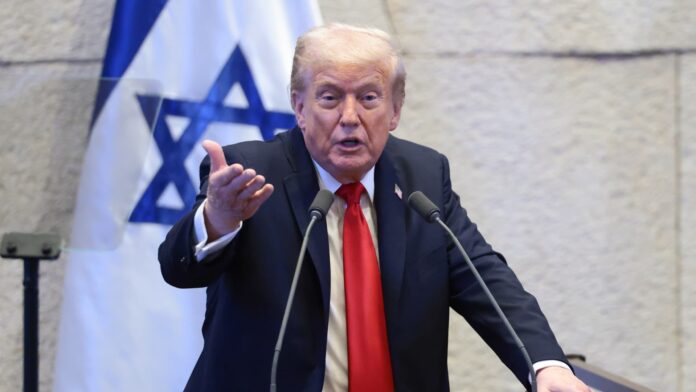U.S. President Donald Trump gestures as he disembarks from Air Force One upon arrival at Ben Gurion Airport on the outskirts of Lod near Tel Aviv on October 13, 2025, as he travels to Israel and Egypt.
Saul Loeb | Afp | Getty Images
U.S. President Donald Trump on Monday declared the war in the Middle East is over, as he embarked on a trip to the region to finalize a peace deal for Gaza.
Trump arrived in Tel Aviv earlier Monday to mark the release of Israeli hostages by Hamas after more than two years in captivity.
Arriving at the Israeli parliament where he was set to address lawmakers, Trump told reporters that Hamas will disarm, according to comments reported by Reuters. When asked whether the war was over, he told reporters “yes.”
Greeted with a trumpet fanfare, standing ovation and cheers in the Knesset, Trump delivered a speech in which he said that the “long and painful nightmare” was finally over for both the Israelis and Palestinians. Trump said America joined its ally in two “everlasting vows”: “Never forget, and never again.”
Signaling a conciliatory mood, the president said the ceasefire was “a very exciting time for Israel and the Middle East” and noted Israel had won all it could “by force of arms.” It was time, he insisted, to turn those efforts into peace and prosperity.

The president called for a peace deal with Iran and said the hand of friendship and cooperation was always open, “even to Iran, whose regime has inflicted so much death on the Middle East.”
“I’m telling you, they want to make a deal,” Trump said, adding: “We are ready when you are.”
Iran is the main foreign backer of Hamas, whose attack on Israel on Oct. 7 2023 saw 1,200 people killed and hundreds taken hostage.
Israel’s response and the ensuing war has left more than 67,000 Palestinians dead, including thousands of civilians, according to Gaza’s Health Ministry. Gaza itself has been largely destroyed with most buildings in ruins.
“You’ve won and now you can build and you can do something you never even thought possible,” Trump said, encouraging Israel to focus on and commit to long-lasting peace efforts.
U.S. President Donald Trump addresses the Knesset, Israel’s parliament, on October 13, 2025 in Jerusalem.
Pool | Getty Images News | Getty Images
He also repeatedly returned to the theme of rebuilding and reconstruction, telling the Knesset that the “total focus of Gazans must be on restoring the fundamentals of stability, safety, dignity and economic development.” Trump said the U.S. intended to help them in this cause.
The U.S. president praised Israeli Prime Minister Benjamin Netanyahu and military chiefs, as well as Arab countries who have helped to broker a ceasefire. He also praised the efforts of his senior officials and advisors, including Middle East envoy Steve Witkoff, Secretary of State Marco Rubio, son-in-law Jared Kushner and Pete Hegseth.
Twenty Israeli hostages are expected to be released in total on Monday, as well as 28 additional captives — including 26 confirmed dead and two whose status remains uncertain. In exchange for the hostages, Israel is due to release almost 2,000 Palestinian prisoners and detainees.
Released Israeli hostage Eitan Abraham Mor gestures to well wishers upon arriving at Beilinson Hospital in the Rabin Medical Centre in Petah Tikva in central Israel on October 13, 2025.
Menahem Kahana | Afp | Getty Images
Trump will address the Israeli parliament after meeting with hostage families. He is then due to travel to Sharm El-Sheikh in Egypt for a major international summit with around 20 other world leaders to finalize an agreement to end the war in Gaza.
The first phase of Trump’s peace deal for Gaza and the release of Israeli hostages is being hailed as a great humanitarian and geopolitical development, but one with a limited economic impact.
“It shows that the U.S. can get results if it wields its still unsurpassed global clout the right way,” Holger Schmieding, chief economist at Berenberg Bank noted Monday.
“The impact on the global economy and markets should remain very limited, though. If the Houthis stop disrupting shipping through the Red Sea, global transport costs may fall slightly. If tensions in the Middle East subside much further, the global impact could be more pronounced in the long run – but that remains a very big if,” Schmieding noted.
Source link





